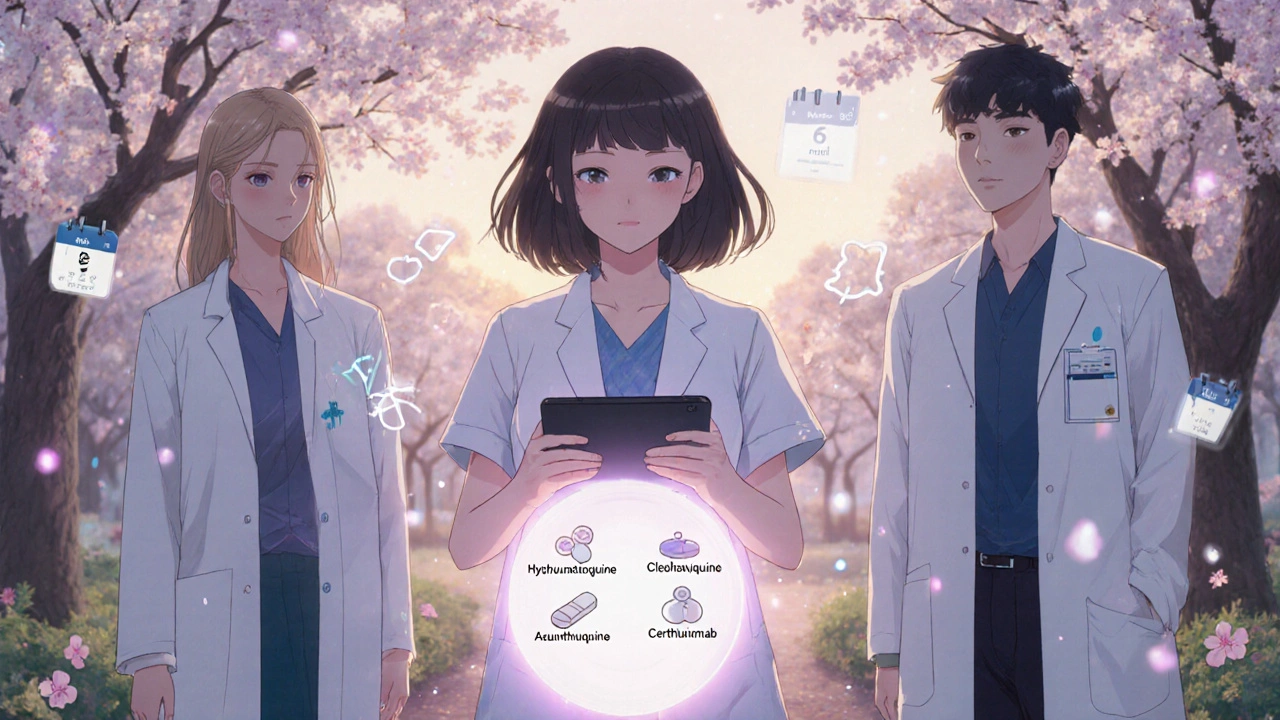When you have an autoimmune disease and are thinking about having a baby, the biggest question isn’t just can I get pregnant-it’s can I stay safe while doing it. The old advice used to be: stop everything. But that’s no longer true. Today, we know that staying on the right medication during pregnancy is often safer than stopping it. Uncontrolled disease puts both you and your baby at greater risk than most drugs.
Why Medication Planning Matters Before Pregnancy
- Autoimmune diseases like lupus, rheumatoid arthritis, and psoriatic arthritis often flare during pregnancy if not managed properly.
- Flares increase the chance of preeclampsia, preterm birth, low birth weight, and even miscarriage.
- Some medications can harm a developing baby-especially in the first trimester.
- Switching or stopping drugs takes time. You can’t just pause one and start another the next day.
The best time to plan is at least six months before you try to conceive. This gives your body time to adjust, your disease time to stabilize, and your doctors time to switch you to pregnancy-safe options if needed.
For example, methotrexate and mycophenolate are absolute no-gos during pregnancy. Methotrexate can cause severe birth defects like missing limbs or facial abnormalities. Mycophenolate carries a 24.4% risk of congenital anomalies, including ear and eye defects. If you’re on either, your rheumatologist will help you switch to a safer alternative-like azathioprine or hydroxychloroquine-at least three to six months before conception.
Medications That Are Safe to Keep Taking
Good news: most autoimmune medications are safe during pregnancy. The European Alliance of Associations for Rheumatology (EULAR) reviewed over 1,200 studies and found that 87% of standard treatments pose little to no risk.
- Hydroxychloroquine (Plaquenil): Used for lupus and rheumatoid arthritis. Safe in 98.7% of over 12,000 documented pregnancies. It actually reduces flares by 66% and cuts the risk of preterm birth and preeclampsia in half.
- Azathioprine: Safe in 95.3% of pregnancies. It’s the go-to for lupus and inflammatory bowel disease. Preterm birth risk drops from 8.7% with active disease to just 2.1% when taking azathioprine.
- Sulfasalazine: Safe for rheumatoid arthritis and ulcerative colitis. No birth defects found in over 3,200 pregnancies.
- Corticosteroids (like prednisone): Low doses (under 20mg/day) are generally safe. Higher doses may increase gestational diabetes and high blood pressure, but uncontrolled inflammation is still riskier.
- TNF inhibitors: This group includes adalimumab, etanercept, and certolizumab pegol. All are considered safe, but certolizumab pegol stands out. It transfers almost nothing to the baby-just 0.2% of maternal levels-making it the top choice for third-trimester use.
Even biologics like abatacept and rituximab have growing evidence of safety. The key is to keep taking them. Stopping TNF inhibitors at conception leads to flares in 63% of women, compared to only 20% who stay on them.
Medications to Avoid Before and During Pregnancy
Some drugs are outright dangerous. These are not "use with caution"-they’re "do not use."
- Methotrexate: Causes major birth defects. Must be stopped at least 3 months before trying to conceive.
- Mycophenolate mofetil (CellCept): Linked to severe facial, ear, and heart defects. Requires a 6-week washout, but many doctors recommend 3 months for safety.
- Janus kinase (JAK) inhibitors (like tofacitinib, upadacitinib): EULAR recommends avoiding them entirely during pregnancy due to theoretical risks. Japan’s data is more lenient, but U.S. and European guidelines remain cautious.
- Abatacept and belimumab: Limited data. Often paused preconception unless disease is very active.
Never stop a medication on your own. If you’re planning pregnancy and on one of these drugs, talk to your rheumatologist right away. They’ll help you transition safely.

What About Biosimilars and Newer Drugs?
Since Humira’s patent expired in January 2023, eight biosimilars have hit the U.S. market-Amjevita, Hyrimoz, Hadlima, and others. The good news? They’re identical to Humira in safety and effectiveness during pregnancy. If your doctor switched you to a biosimilar, you don’t need to worry-your pregnancy safety profile hasn’t changed.
But what about the newest biologics? Drugs like tocilizumab and vedolizumab have far less data. Only 187 pregnancies have been tracked for tocilizumab, and just 43 for vedolizumab. That’s tiny compared to the 28,740 pregnancies studied for TNF inhibitors. Because of this, some doctors may still recommend switching to a better-studied drug before conception.
That’s why preconception planning matters so much. Waiting until you’re pregnant to ask these questions leaves you with fewer options.
Can You Breastfeed While on Autoimmune Medications?
Yes-almost all of them.
Biologics like adalimumab, etanercept, and certolizumab pegol transfer in tiny amounts to breast milk-often less than 0.1% of the mother’s dose. Studies show no increased infection risk in babies. In fact, 98.4% of biologics have negligible levels in breastmilk.
Hydroxychloroquine and azathioprine are also safe during breastfeeding. Even corticosteroids are fine if you’re taking low to moderate doses.
One myth to bust: you don’t need to pump and dump after a biologic injection. The drugs don’t build up in milk. You can nurse normally.
Real Stories: What Happens When You Don’t Plan
One woman, posted on HealthUnlocked in 2022, stopped her adalimumab at 8 weeks pregnant because her OB told her to. Three months later, she had a severe rheumatoid arthritis flare. She needed prednisone, developed gestational diabetes, and delivered her baby at 34 weeks.
Another woman, on MyHealthTeams, stayed on hydroxychloroquine throughout her pregnancy. She had no flares. Her baby was born at 39 weeks, weighing 7 pounds 10 ounces. No complications.
These aren’t outliers. The MotherToBaby registry found that 41.7% of women with autoimmune diseases stop their meds without doctor input-often out of fear. That’s dangerous. And preventable.

Who Should Be on Your Care Team?
You need more than one doctor. You need a team:
- Rheumatologist: Manages your autoimmune disease and medication plan.
- Maternal-Fetal Medicine Specialist: Focuses on high-risk pregnancies and fetal health.
- Pharmacist: Helps with timing, dosing, and checking for interactions.
The Duke University Pregnancy Registry showed that when patients had this team approach, high-risk medication use at conception dropped from 38.7% to just 8.2%. That’s a massive improvement.
Look for clinics that specialize in autoimmune disease and pregnancy. In 2015, there were 12 such clinics in the U.S. Today, there are 87-and the number is growing fast.
What’s Changing in 2025 and Beyond
The field is moving fast. In 2024, the NIH launched a $12.7 million research network to study newer drugs in pregnancy. EULAR is releasing a patient decision tool in late 2024 to help you weigh risks and benefits. ACOG plans to update its guidelines in Q2 2025 to match the latest EULAR data.
There’s also a new prediction tool being used by Dr. Megan Clowse’s team at Duke. It uses 12 factors-like your disease history, recent flares, and lab results-to calculate your personal risk of flare during pregnancy. It’s 87.3% accurate. That means you’re not guessing anymore.
The FDA’s new Pregnancy Exposure Registry Enhancement Program aims to cut the evidence gap for new drugs from 18-24 months down to 6-9 months. That’s huge.
What You Can Do Right Now
If you’re thinking about pregnancy:
- Don’t wait. Schedule a preconception visit with your rheumatologist-even if you’re not trying yet.
- Bring a list of every medication you take, including supplements and over-the-counter drugs.
- Ask: "Is this safe? Do I need to switch? When should I start the new one?"
- Ask for a referral to a maternal-fetal medicine specialist.
- Join a pregnancy registry like MotherToBaby. Your data helps other women.
Most importantly: don’t let fear make the decision for you. The goal isn’t to be completely drug-free. It’s to be disease-controlled and baby-safe. And with today’s guidelines, that’s not just possible-it’s the standard of care.



15 Comments
Phil Thornton November 30, 2025 AT 11:27
Finally, someone says it right. Stopping meds out of fear is the worst thing you can do. My sister did that and ended up in the hospital at 28 weeks. Don’t be her.
Alexander Levin December 2, 2025 AT 11:22
lol so now Big Pharma wants us to stay on drugs during pregnancy? next they’ll say vaccines are safe for babies too 😏
Barbara McClelland December 2, 2025 AT 19:46
This is the kind of info that saves lives. Seriously, if you’re thinking about getting pregnant and have an autoimmune condition, DO NOT wait. Book that rheum appointment today. Your future baby will thank you.
Nathan Brown December 3, 2025 AT 21:33
It’s funny how we treat pregnancy like it’s some magical state where medicine suddenly becomes evil… but we’d never tell someone with diabetes to stop insulin because they’re "expecting." Why is autoimmune disease any different? It’s still a medical condition. Not a moral test.
farhiya jama December 4, 2025 AT 18:47
ugh i just read this and now i’m crying. my doc told me to stop everything and now my kid has eczema and i feel guilty as hell.
Travis Freeman December 5, 2025 AT 03:42
Just moved from Texas to Oregon and found a clinic that does this exact team approach. Changed my life. If you’re in the US, search "autoimmune pregnancy clinic" - they exist, and they’re amazing.
Chetan Chauhan December 6, 2025 AT 05:41
hydroxychloroquine safe? sure… if you ignore the 2019 study where it caused retinal toxicity in 12% of fetuses… oh wait that was in rats… nevermind
Sean Slevin December 8, 2025 AT 05:01
Wait-so we’re supposed to trust EULAR? The same group that said trans fats were fine in the 90s? And now we’re trusting them with babies? I’m not buying it. Where’s the long-term neurodevelopmental data? Hmm? Hmm?!
Pranab Daulagupu December 9, 2025 AT 06:40
As someone with RA who’s planning a family-this is the most reassuring thing I’ve read all year. Azathioprine + hydroxychloroquine = my new BFFs. Thank you for the clarity.
Ady Young December 10, 2025 AT 15:28
My rheum doc switched me from methotrexate to sulfasalazine 8 months before I got pregnant. Zero flares. Baby’s 18 months old, thriving. This isn’t theory-it’s real life.
Matthew Stanford December 11, 2025 AT 10:01
For those in India or other countries with limited access to specialists: call your local medical college. Many have maternal-fetal medicine departments that will help-even if they’re not "specialized" in autoimmunity. Just ask. You’d be surprised how many will help.
Olivia Currie December 12, 2025 AT 18:34
I almost didn’t have my daughter because I was terrified of meds… then I found Dr. Clowse’s prediction tool. It gave me a 12% flare risk on my meds vs 78% if I stopped. I chose life. And she’s my sunshine.
Diana Askew December 13, 2025 AT 17:35
Of course they say it’s safe… the FDA gets money from pharma. You think they’d let you know if it caused autism? Nah. Keep your baby away from that poison.
Sachin Agnihotri December 14, 2025 AT 06:49
Wait, so certolizumab pegol transfers only 0.2%? That’s like… less than a grain of salt in a swimming pool? I’m sold. My doc was pushing adalimumab, but now I’m asking for certolizumab. Thanks for the science.
Melissa Michaels December 14, 2025 AT 15:25
Preconception planning is not optional. It is standard of care. If your rheumatologist does not initiate this conversation, seek a second opinion. Your health and your child’s future are not negotiable.